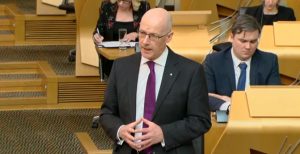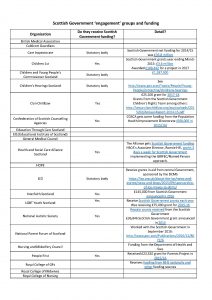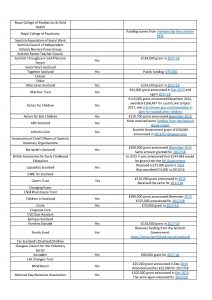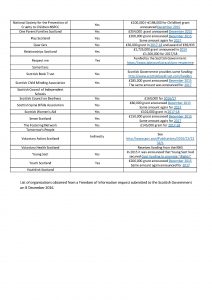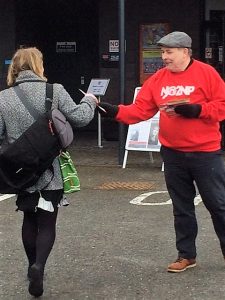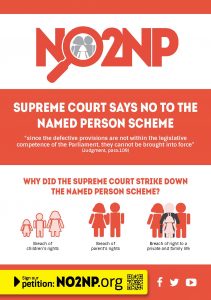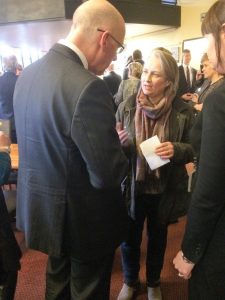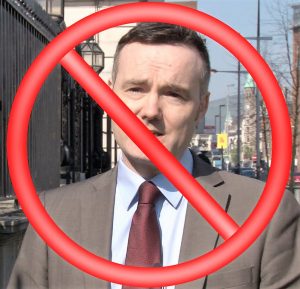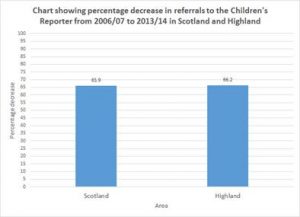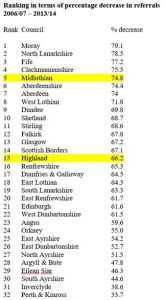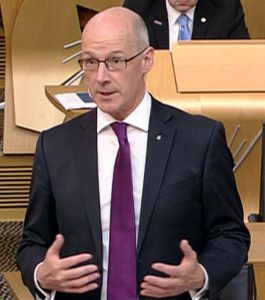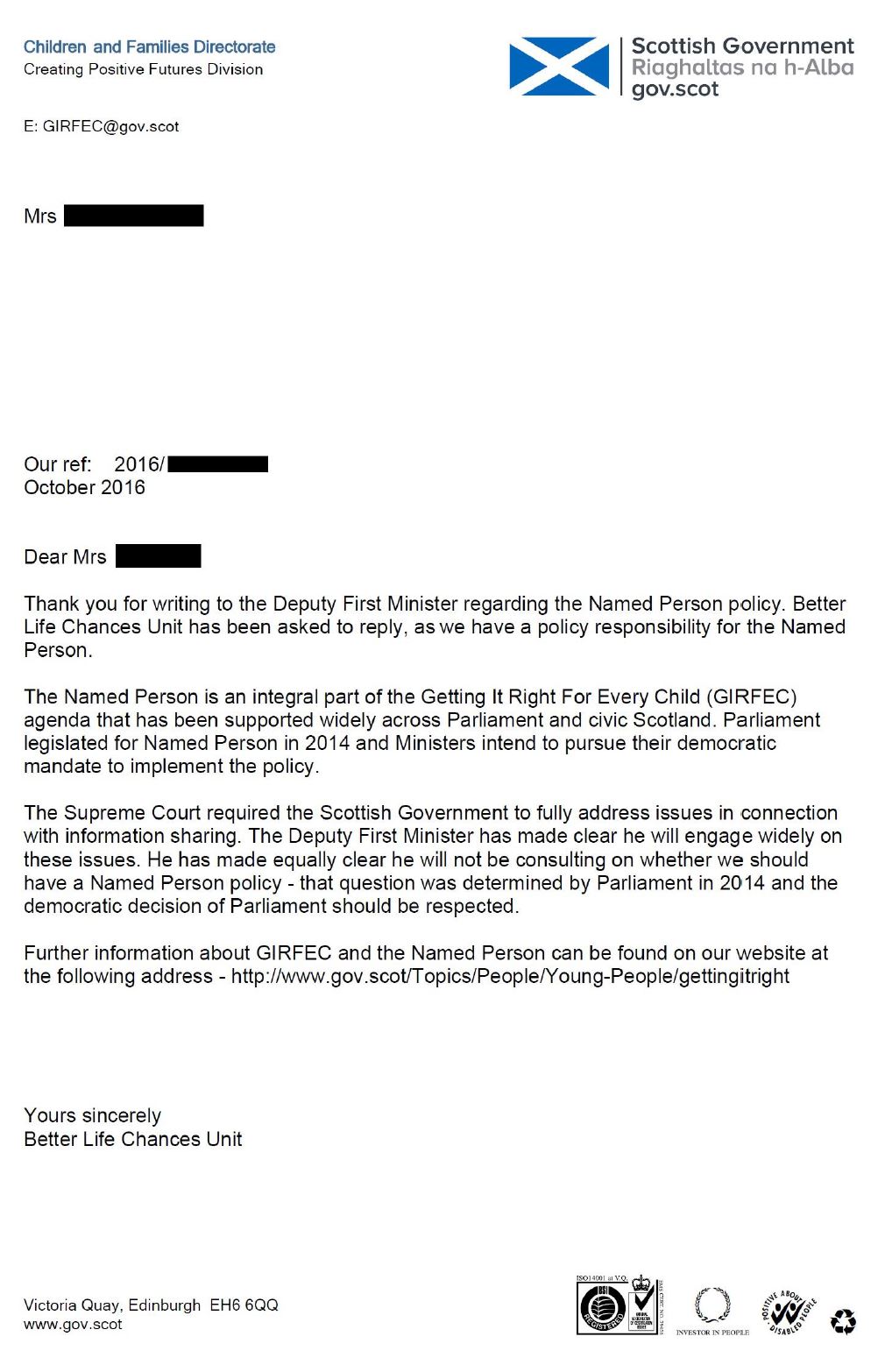Blog
Keeping you up to date on the progress of the Named Person scheme and the NO2NP campaign.
Has the Named Person scheme really been scrapped and where do we go from here?
Posted 5 years agoYesterday Deputy First Minister John Swinney announced in the Scottish Parliament:
“We will now not underpin in law the mandatory named person scheme for every child. We will withdraw the Children and Young People (Information Sharing) (Scotland) Bill and repeal the relevant legislation.
“Instead, existing voluntary schemes that provide a point of contact for support will continue, under current legal powers, when councils and health boards wish to provide them and parents wish to use them.”
Mr Swinney’s announcement led to widespread media coverage, with some containing misleading content. So here we set the record straight.
What named person scheme has been scrapped?
It was a mandatory scheme
The Scottish Government wanted a statutory scheme which would make it mandatory to appoint a Named Person to monitor the ‘wellbeing’ – or ‘happiness’ – of every child in Scotland. Whether the family wanted one or not it would have been imposed, with or without the family’s knowledge.
The proposed scheme was not a ‘voluntary point of contact for parents who wanted it’ as some media reports suggest. If it was a voluntary service, that would have been uncontroversial.
But this was about compulsory state-sanctioned monitoring of every child in Scotland. Parents have spoken out about uncovering detailed dossiers filled with inaccurate information on them, which have been compiled by Named Persons behind their backs and used in damaging ways.
It was about monitoring wellbeing
The proposed scheme tried to give Named Persons legal powers to grab and share information at the low level of ‘wellbeing’. It was not about monitoring welfare as some media reports suggest. Social services and police already have legal powers to monitor welfare concerns.
Professionals working in child protection can already share information if they think there is a ‘risk of significant harm’, and intervene where necessary. The proposed Named Person scheme was not about welfare, but about monitoring ‘wellbeing’.
Commenting on the concept of wellbeing found in the policy, the UK Supreme Court ruling stated: “‘Wellbeing’ is not defined. The only guidance as to its meaning is provided by section 96(2), which lists eight factors to which regard is to be had when assessing wellbeing. The factors, which are known under the acronym SHANARRI, are that the child or young person is or would be: “safe, healthy, achieving, nurtured, active, respected, responsible, and included”. These factors are not themselves defined, and in some cases are notably vague: for example, that the child or young person is “achieving” and “included””.
Elsewhere in the judgment the justices stated:
“[T]he assessment of that wellbeing under section 96… involves the use of very broad criteria which could trigger the sharing of information by a wide range of public bodies… and also the initiation of intrusive inquiries into a child’s wellbeing.”
The judges concluded that sharing private information at the level of ‘wellbeing’ “may in practice result in a disproportionate inference with the article 8 rights of children, young persons and their parents”.
It breached human rights
Let’s remind ourselves what else the July 2016 UK Supreme Court judgment said.
The ruling noted that “the sharing of personal data between relevant public authorities is central to the role of the named person” (para. 78).
It then concluded that these information-sharing provisions:
• Were incompatible with the rights of children, young persons and parents under article 8 of the European Convention on Human Rights;
• May in practice result in a disproportionate interference with the article 8 rights of many children, young persons and their parents, through the sharing of private information;
• Were “not within the legislative competence of the Scottish Parliament”, deeming the legislation “defective” and blocking it from coming into force.
Bizarrely, Mr Swinney responded to the ruling at the time by saying: “I welcome the publication of today’s judgment and the fact that the attempt to scrap the named person service has failed.”
But three years later, he finally has to admit that the mandatory Named Person scheme, with legal powers to grab and share private information at the low level of wellbeing, cannot work without breaching the human rights of children and families.
It had to be scrapped.
So, where do we go from here?
John Swinney said in his statement yesterday: “Instead, existing voluntary schemes that provide a point of contact for support will continue, under current legal powers, where councils and health boards wish to provide them and parents wish to use them.”
A voluntary single point of contact
If you still see a Named Person service being offered, it will now be on a strictly voluntary basis. It will be up to councils and health boards to decide if they wish to offer a voluntary named person or some kind of voluntary single point of contact for parents, and it will be up to parents to decide if they want to use the service.
This ‘voluntary single point of contact’ will not be able to share information on ‘wellbeing’ concerns at will. Instead it will have to adhere to current data sharing frameworks.
There will no longer be a statutory Named Person service imposed on every child in Scotland.
Parents can feel confident that when they are given advice or offered a service by a voluntary ‘Named Person’ or ‘voluntary single point of contact’, they do not have to accept it.
As the 2016 Supreme Court judgment stated: “Care should therefore be taken to emphasise the voluntary nature of the advice, information, support and help which are offered”.
Will this reduce the level of protection for children?
We have always been concerned about the Named Person scheme diverting valuable resources away from vulnerable children who genuinely need help.
A significant case review into the tragic death of Fife toddler Liam Fee stated that the role of the Named Person “may have contributed to confusion”.
And the significant case review into the sad death of Inverness toddler Clyde Campbell mentioned the child’s Named Person, as among those who could have done more.
The report from Highland Child Protection Committee stated serious concerns “were not appropriately escalated to senior social care managers”.
Finding a vulnerable child is like finding a needle in a haystack, and the Named Person scheme, as proposed by the Scottish Government, would have made the haystack bigger, placing an even greater burden on already overstretched child protection services.
Now child protection services can concentrate time and resources on helping children who are genuinely at risk of significant harm.
Good news! Scot Gov finally scraps Named Person scheme
Posted 5 years agoThis afternoon Deputy First Minister John Swinney announced that Named Persons, with powers to grab and share your private information, will finally be scrapped.
The statement comes following the news that Mr Swinney’s ‘expert panel’ was unable to find a solution to fix the unlawful information sharing aspects of the Bill, which were struck down by the UK Supreme Court three years ago.
In a statement today Mr Swinney told the chamber:
“I am therefore giving notice of our intention to seek to repeal Parts 4 and 5 of the Children and Young People (Scotland) Act 2014, using a suitable legislative vehicle in due course.
“I believe that today we have taken an important step forward in providing families and practitioners with certainty about how information sharing can support wellbeing in a transparent way which respects the rights of everyone.
He confirmed: “The mandatory named person scheme for every child – underpinned by law – will now not happen. We will withdraw our Bill and repeal the relevant legislation.
“Instead, existing voluntary schemes that provide a point of contact for support will continue under current legal powers, where councils and health boards wish to provide them and parents wish to use them.
When pressed in the chamber to apologise to families across Scotland, Mr Swinney refused.
NO2NP spokesman Simon Calvert said: “We mustn’t forget that the Supreme Court ruled that Mr Swinney’s legislation breached the human rights of families, and he’s never apologised for that.
“He’s eventually done the right thing, but he has done a lot of damage to public trust over the last couple of years by trying to prop up the Named Person scheme.
“Nevertheless, this is good news for families all across Scotland and it’s a great relief for a lot of people.”
He continued: “The question now is what is the Scottish Government going to do to unpick all of the legally inaccurate training that it’s been giving to local authority and health board officials over the last five years?
“There’s a big job of work to do to make clear to those people that they don’t have the powers that the Scottish Government wanted them to have.”
‘Unworkable’ Named Person Bill blocked by Holyrood committee
Posted 6 years agoHolyrood’s Education and Skills Committee has refused to back the Named Person information sharing Bill, in what may be the biggest setback to the scheme since it was declared unlawful by the UK Supreme Court last year.
Yesterday, the Committee told Deputy First Minister John Swinney that they cannot properly assess the Bill until they have an “authoritative draft” of the Code of Practice explaining how it will operate. Mr Swinney has previously said he is “not minded” to consult on the Code of Practice until the legislation has passed.
The Committee’s letter said that without the code “the majority of the Committee do not consider that they are able to make a decision on whether to recommend that the general principles of the bill be approved”.
In taking this action the Committee has rejected John Swinney’s attempt to railroad through the legislation without addressing the concerns of the UK Supreme Court.
Mr Swinney responded to the Committee’s decision by announcing he will form a new independent panel to try to persuade the public that the Named Person policy is ‘workable’.
NO2NP spokesman Simon Calvert commented: “This is further evidence of the terrible handling of this policy. The Committee has shown it will not have the wool pulled over its eyes and has bravely stood up to John Swinney.
“Initially he and the Scottish Government tried to steamroller through this deeply flawed and unworkable Bill without giving MSPs the chance to see the crucial details of how it would work in practice.
“Expert witnesses from the legal world and practitioners who will have to work with this scheme have all warned about the dangers and shortcomings of this Bill.
“The Committee has taken heed of that evidence – unlike the Government, which has ploughed on regardless. Now it is being forced to go back and think again.
“John Swinney cannot ignore this and must act on the Committee’s letter. He’s kept MSPs, parents and practitioners in the dark. It’s time he saw the light and consigned this appalling legislation to the Holyrood dustbin. It’s clearly not fit for purpose. MSPs know that. Parents and practitioners know that too. In fact everyone seems to know that except the Scottish Government.
“As things stand, the legal advice we have received is that the new Bill is vulnerable to more court action with good prospects of a victory for any challenge.”
In a parting shot, the Committee also addressed accusations that the Scottish Government had applied pressure to some of the witnesses who are before it to give evidence, demanding reassurances that the Government had not “sought to directly influence evidence to the Committee”.
Named Persons pummelled by lawyers and health professionals
Posted 7 years agoLawyers and health professionals have expressed major concerns about the Named Person information sharing bill.
Giving evidence to the Scottish Parliament’s Education and Skills Committee, Kenny Meechan representing the Law Society of Scotland said teachers and other professionals who have to navigate the complex proposals “will need their lawyer on speed dial”.
Janys Scott QC, on behalf of the Faculty of Advocates, told MSPs that if families don’t know what professionals are going to do with their personal information it may affect what they are willing to share.
She gave the example of a mum who may be hesitant to talk about her post-natal depression with medical professionals if she thinks it might be fed back to her child’s teachers. NO2NP has long argued that the invasive Named Person scheme would damage trust between families and professionals.
Both lawyers said the Scottish Government’s current plans could result in further legal challenges.
The lack of definition of the term “wellbeing” remained a central problem, and concerns were raised about potential confusion over the threshold for intervention by a Named Person.
The Faculty’s written submission to the Committee highlighted “two principal issues” that had been identified by the Supreme Court: “The first was that there was a serious lack of clarity for those implementing the legislation and the second was the lack of safeguards for those affected”.
It warned: “Neither of these issues is easy to resolve and some of the criticisms of the Supreme Court will continue to apply if the Bill as drafted is passed and the accompanying Code of Practice is approved.”
Swinney grilled
Yesterday Education Minister and Deputy First Minister John Swinney was grilled about the Faculty’s concerns. MSPs on the Delegated Powers and Law Reform Committee asked why he was snubbing the nation’s leading lawyers.
He responded saying: “I disagree with the Faculty of Advocates.”
NO2NP spokesman Simon Calvert commented on the Deputy First Minister’s response saying: “It is quite astonishing that having been condemned by the Supreme Court the Government is still not willing to listen to legal advice.”
Health professionals were also invited to give evidence to the Education and Skills Committee today.
Royal College of Nursing Scotland’s Policy Officer Lorna Greene said the ‘duty’ on professionals to ‘consider’ sharing private information on families could have “quite a significant impact in the form of leading to defensive practice”.
She warned that by putting in the duty to consider they were “leading professionals towards what might become a tick-box exercise and which could take away from meaningful practice” and commented that it was a “very vague strange concept”.
Annette Holliday Health Visitor and Unite member told MSPs: “There’s nervousness about where responsibilities lie around delivering of Named Person services.”
Swinney told MSPs yesterday that “the law must be crystal clear”. It seems to us and to anyone who is listening, that the law in its current form is anything but clear.
Named Person data-sharing ditched In Scottish Government U-turn
Posted 7 years agoDeputy First Minister John Swinney announced yet further delays to the Named Person scheme in a statement to the Scottish Parliament today.
He proposed bringing forward a bill that would include new Named Person data-sharing provisions, in an attempt to address concerns raised by the Supreme Court last July.
Setting out a proposed timetable he said the bill would be expected ahead of the summer recess with the view of commencement in 2018.
He told Parliament this afternoon that the Named Person legislation would be amended to comply with the Supreme Court ruling. He said: “information sharing that was rooted in consent, engagement and empowerment of families was the best way forward. Only in exceptional circumstances, such as where the risk of harm was present, should we consider departing from those core principles.”
This is simply a restatement of the existing law. This is what we argued for in the Supreme Court, and the judges agreed with us.
NO2NP spokesman Simon Calvert commented:
“However they try to spin it, this is a major climbdown by the Scottish Government.
“After two years of causing fear and confusion amongst parents, they are now conceding that they cannot lower the threshold for non-consensual disclosure of personal information on families.
“They are reverting to the existing threshold of ‘risk of harm’.
“It’s about time.
“It all goes to show what a complete waste of time and money it has been to try to create a system to allow officials to pass round confidential personal information on children and families almost at will.
“Mr Swinney says he is going to create a new statutory duty on Named Persons to comply with their existing statutory duties in the Data Protection Act and Human Rights Act. This is pointless and superfluous. It is little more than a face-saving exercise for the Scottish Government.
“Ever since they lost in the Supreme Court the Scottish Government has been trying to downplay the significance of the ruling and, in particular, of their data sharing provisions which the court said breached human rights.
“This ‘central’ element of the scheme is now history.
“On the day of the ruling in July last year they were telling the BBC they hoped to roll out the system before the end of the 2016. By September were talking about an ‘ambition to work towards August 2017’. Now they admit it will take until 2018.
“Today’s climbdown is a recognition of the reality of the Supreme Court defeat. It is a major victory for parents and for those in the NO2NP campaign who brought the successful legal challenge.”
NO2NP supporters also commented on the announcement.
Dee Thomas, mum of four, said: “It is now left to the people of Scotland to demonstrate to this Government just how much this legislation is unwanted by most parents, unnecessary for the vast majority and will leave the truly vulnerable even more so.”
Dr Stuart Waiton, Senior Lecturer, Division of Sociology at Abertay University, said: “Swinney and the Scottish Government are obsessed with early intervention. They seem to think, not that families are positive and important and generally good, but that they are ticking time bombs, sites of abuse or just bad or inadequate parenting, that need an army of experts in waiting, keeping a constant check on us all so that they can give us that ‘extra help’ when they think we need it. The Named Person in any form is an imposition on families and a threat to our private lives. Swinney needs to scrap the Named Person and the GIRFEC approach, stop trying to monitor all of our children and focus resources on those children and families who really need it.”
Lesley Scott, Scottish Officer for Tymes Trust, said: “Mr Swinney in his statement to Parliament today on the proposed revisions to the Named Person legislation repeated many of the familiar arguments that have already been thoroughly demolished over the past three years.
“Not least of these was his claim that ‘wellbeing is defined by the Children & Young People (Scotland) Act 2014’. Either Mr Swinney has not read the full ruling from the UK Supreme Court or he is being wilfully misleading. The judgment from the Supreme Court states clearly on page 8: ‘Wellbeing is not defined’.
“To get such a basic and fundamental point so wrong does not bode well for any revision to a scheme that is rooted in safeguarding, promoting and supporting that very concept. Without a legally robust definition of ‘wellbeing’, GIRFEC and the Named Person are unworkable and the Deputy First Minister’s continued commitment to this scheme will simply result in further inappropriate unjustified interference by the state in the lives of Scottish families.”
CARE’s Scotland Parliamentary Officer, Dr Gordon Macdonald said: “The Named Person Scheme has been strongly criticised by both parents and leading professionals across all spheres of life – education, health and law enforcement. The Scottish Government must listen the majority and not shoehorn in a proposal that is deeply unpopular and serves to undermine the role of parents in family life.”
Named Person fact check: ‘just needs a few tweaks’
Posted 7 years agoSCOTTISH GOVERNMENT CLAIM:
Ever since they lost in the Supreme Court the Scottish Govt has been trying to downplay the significance of the ruling and of the information sharing provisions which the court ruled to be a breach of human rights. For example:
“I welcome the publication of today’s judgment and the fact that the attempt to scrap the named person service has failed.
“The Supreme Court has stated that the aim of the legislation, in promoting and safeguarding the wellbeing of children and young people, is ‘unquestionably legitimate and benign’. It makes clear that the principle of providing a named person to support children and families does not breach human rights.
“The court’s ruling requires us to provide greater clarity about the basis on which health visitors, teachers and other professionals supporting families will share and receive information in their named person role. We will start work on this immediately so we can make the necessary legislative amendments. The service will be implemented nationally at the earliest possible date.”
Press release from the Deputy First Minister, 28 July 2017
“Last year the Supreme Court ruled definitively that the intention of providing a Named Person for every child to promote and safeguard their wellbeing was ‘unquestionably legitimate and benign’. Their judgement did, however require us to change the provisions relating to information sharing.”
Press release from the Deputy First Minister, 6 March 2017
“The Supreme Court determined that Ministers needed to provide greater clarity about the basis on which health visitors, teachers and other professionals supporting families will share and receive information in their named person role.”
Letter from Scottish Government’s “Better Life Chances Unit”, February 2017
REALITY:
The Supreme Court said (emphasis added):
2. On its introduction in April 2013, the Children and Young People (Scotland) Bill was accompanied by a Policy Memorandum which was similar in content to the consultation paper.
…
It provided for a wide-ranging duty on all relevant public authorities to cooperate with the named person in the conduct of their duties. This would be of particular importance in the area of information sharing, since the “role of the named person will depend on the successful sharing of information between relevant public authorities” (para 73).
3. The memorandum explained that concern had been expressed about the existing legal framework for information sharing. This was felt to be confusing and potentially insufficient to enable the role of the named person to operate as well as anticipated. In particular, there were concerns regarding sharing information about children where consent was not given (para 75). The memorandum continued:
“Currently, information about a child may be shared where the child is at a significant risk of harm. However, the role of the named person is based on the idea that information on less critical concerns about a child’s wellbeing must be shared if a full picture of their wellbeing is to be put together and if action is to be taken to prevent these concerns developing into more serious issues. Without the necessary power to share that kind of information, the named person will not be able to act as effectively as is intended … Specific provisions in the Bill, therefore, set out arrangements on information sharing, to give professionals and named persons the power to share information about those concerns.” (paras 76-77)
4. It appears, therefore, that one of the principal purposes of Part 4, as envisaged at that stage, was to alter the existing law in relation to the sharing of information about children and young people, so as to enable information about concerns about their wellbeing, held by individual bodies, to be pooled in the hands of named persons and shared with other bodies, with the ultimate aim of promoting their wellbeing.
78. … while article 8 is engaged, not all that may be done under Part 4 would involve an interference with a person’s article 8 rights. There are elements of the role of the named person which are unlikely, by themselves, to involve any interference with the right of a parent, child or young person to respect for his or her private and family life. Thus, by themselves, the functions in section 19(5)(a)(i) and (ii) of providing advice, information and support and helping the parent, child or young person to access a service or support would not normally constitute an interference with the article 8 rights of either the child or his or her parents. But it is clear from the consultation paper, “A Scotland for Children” and the Policy Memorandum, which we discussed in paras 1 to 3 above, that the sharing of personal data between relevant public authorities is central to the role of the named person. As we have explained, this may well constitute an interference with the article 8 rights of those to whom the information relates. We are therefore satisfied that the operation of the information-sharing provisions of Part 4 (in particular, sections 23, 26 and 27) will result in interferences with rights protected by article 8 of the ECHR. The question therefore arises whether such interferences can be justified under article 8(2).
Named Person Fact Check: ‘Intense period of engagement’
Posted 7 years agoSCOTTISH GOVERNMENT CLAIM:
“Since the judgement, we have undertaken an intensive period of engagement with children, young people, parents, carers, practitioners and professionals.”
Press release from the Deputy First Minister, 6 March 2017
REALITY:
We have received complaints from numerous parents whose approaches to Mr Swinney were effectively ignored. In response to personal emails to Mr Swinney telling their stories and asking him to hold public meetings, all they got was a short, dismissive, unsigned stock reply from an unnamed official.
The Scottish Government specifically refused to meet with NO2NP, stating:
“we are not discussing the principle of the Named Person policy as the Supreme Court found it to be legitimate and benign. Your organisation has made it clear that it is against the provision of Named Persons, so there is a fundamental policy disagreement. The Scottish Government are engaging with people who wish to improve the legislation not those who wish to revisit a debate on its establishment as this has been agreed by Parliament.”
Polls show that only 24% of the population think every child should have a Named Person. By refusing to speak to anyone representing the overwhelming majority who don’t back their policy, the Government closed the door on advice which could help them to avoid more catastrophic blunders.
Despite this, NO2NP encouraged its supporters to email the Government anyway, which they did in their hundreds.
Here is the list of those the Government says it “engaged”. Note how many are in receipt of Government funding.
Named Person Fact Check: ‘legitimate and benign’
Posted 7 years agoSCOTTISH GOVERNMENT CLAIM:
“Last year the Supreme Court ruled definitively that the intention of providing a Named Person for every child to promote and safeguard their wellbeing was ‘unquestionably legitimate and benign’”
Press release by the Deputy First Minister, 6 March 2017
REALITY:
What the court actually said was:
“The public interest in the flourishing of children is obvious. The aim of the Act, which is unquestionably legitimate and benign, is the promotion and safeguarding of the wellbeing of children and young persons.” (para. 91)
It was “The aim of… the promotion and safeguarding of the wellbeing of children and young persons” that was benign, not the Named Person.
What the court said about the Named Person was:
“…the sharing of personal data between relevant public authorities is central to the role of the named person … the operation of the information-sharing provisions of Part 4… will result in interferences with the rights protected by article 8 of the ECHR” (para. 78).
“It is thus perfectly possible that information, including confidential information concerning a child or a young person’s state of health (for example, as to contraception, pregnancy or sexually transmitted disease), could be disclosed… to a wide range of public authorities without either the child or young person or her parents being aware of the interference with their article 8 rights” (para. 84).
“We conclude therefore that the information-sharing provisions … as currently drafted do not meet the article 8 criterion of being ‘in accordance with the law’.” (para. 85).
The Supreme Court said the confused drafting of the law created “very serious difficulties” for anyone attempting to understand or implement it and expressed “even greater concern” about “the lack of safeguards” [Paragraphs 83-84].
Because of the lack of safeguards “the overriding of confidentiality is likely often to be disproportionate” (para. 100).
They concluded:
“…the information-sharing provisions of Part 4 of the Act are not within the legislative competence of the Scottish Parliament” (para. 106).
“…since the defective provisions are not within the legislative competence of the Parliament, they cannot be brought into force” (para. 109).
After losing the case, the Scottish Government asked the court not to force them to pay their opponents legal costs. They claimed they had only lost on a “relatively limited ground”. The Supreme Court rejected this argument and ordered them to pay all the costs of the case.
Clearly the Supreme Court did not think the Named Person was “legitimate and benign”.
Watch John Swinney’s statement to Parliament on Named Persons today at about 2:20pm: www.scottishparliament.tv
SCOTTISH GOVERNMENT’S VEIL OF SECRECY IN SHAM NAMED PERSON ‘CONSULTATION’
Posted 7 years agoThe Scottish Government has thrown a veil of secrecy around stalled efforts to salvage its Named Person scheme after judges declared their original plans illegal.
Education Secretary John Swinney ordered a three month “intense engagement” period after the UK Supreme Court blocked the planned implementation of the scheme from August 31 last year. Officials also stated: “Before the end of 2016, the Deputy First Minister intends to return to Parliament and announce the next steps.”
But two months into 2017 there have still been no updates from the Government. A standard reply letter saying the Minister will return to Parliament “in the new year” is still being issued by officials.
A NO2NP supporter filed a Freedom of Information (FOI) request last month in a bid to secure access to the minutes of these “engagement” meetings since August last year.
Normally such minutes must be made public, but officials blocked their request, exempting the Government from handing over the data “because we intend to publish that information within 12 weeks of the date of your request” (12 January 2017).
The letter responding to the FOI request states:
“We have found that, on balance, the public interest lies in favour of upholding the exemption. We recognise that there is some public interest in release because of the interest in the content of discussions at the meetings, and this will be met by our planned publication. In the meantime, there is a greater public interest in taking the time necessary to ensure the information has been properly collated and checked before it is published as planned.”
Lesley Scott of Tymes Trust, who submitted the FOI request, said: “It would seem that the Scottish Government has learnt nothing over the last 3 years and is determined to repeat the same mistakes that ended up in them losing in the UK Supreme Court last year.
“Not only did they bar anyone who disagrees with the Named Person scheme from taking part in the ‘intense engagement’ in the first place, they are now refusing to even let us know what was said.
“For a Government that claims to value openness, transparency and citizen participation it has fallen far short of its aims yet again.”
NO2NP spokesman Simon Calvert said:
“The engagement period was really a sham consultation because Mr Swinney only wanted to deal with those who support the scheme and organisations mainly funded by the Government.
“He refused to engage with us even though we represent an important cross-section of Scottish society, huge numbers of parents and more than 35,000 people who signed our petition. We have led the public discussion on this issue for two years – we even won an award for our campaign – yet he won’t meet with us.
“The three-month ‘engagement’ has long since ended. It looks like it could be more like six or seven months – March or April 2017 – before we hear anything.”
“It just shows how difficult they are finding it to salvage their Named Person plans. The initial Government reaction to the Supreme Court ruling was to pretend we’d lost our challenge – a classic example of spin and denial.
“On the day of the ruling in July they were telling the BBC they hoped to roll out the system before the end of the 2016. By September were talking about an “ambition to work towards August 2017”. Now even that looks optimistic if they are going to bring in a Bill and get it through all its stages in Parliament – and consult on new statutory guidance to go with it – in time for the summer recess.”
NO2NP ACTION DAY: SCOTTISH CABINET AT PITLOCHRY
Posted 7 years agoOn Monday this week, around 200 local residents from across Perth and Kinross attended a public meeting hosted by the Scottish Cabinet at Pitlochry Festival Theatre.
The purpose of the meeting was to enable local residents to air their concerns about issues affecting them so, since the Scottish Government’s imposition of a Named Person will affect every single family with children under 18 in Perth and Kinross (as well as the rest of Scotland), NO2NP volunteers were there to greet them.
The flyer that most people took summarises what the Supreme Court judgment achieved last July in stopping the unpopular legislation in its tracks. In a nutshell, the Named Person’s blanket powers to ‘grab and share’ data on families were unanimously struck down by the judges.
One gentleman had not heard of the campaign but as soon as he was told, he was enthusiastically in support of it. Another delegate’s outraged response at the scheme was another example of how angry people are at the imposition of such a scheme on every family in Scotland. Especially when it was never consulted on or requested by the vast majority of Scottish parents.
Even Deputy First Minister John Swinney took a leaflet – we hope it will remind him that he still needs to make his announcement on the future direction of revised Named Person legislation in light of the Supreme Court’s damning judgment.
There were lots of questions asked at the meeting and sadly there wasn’t time for everyone to ask their questions publicly. But, to their credit, the Cabinet met delegates over tea and coffee afterwards, and local NO2NP supporter Lesley Scott took this opportunity to ask the Deputy First Minister her question.
She wanted to know why the Scottish Government had not told Perth and Kinross Council to remove inaccurate data sharing guidance from their website, since they had removed it from their own. The Council made the excuse that the Scottish Government had not told them to remove it.
Mr Swinney argued that each local authority was an elected body that was autonomous in its decision-making – but Perth and Kinross Council don’t seem to think so…! “Does the Information Commissioner’s Office have the power to tell the Council to remove it?” Lesley then asked. The Deputy First Minister agreed to look into the matter, so we’ll be keeping an eye on developments.
In the meantime, preparations are well underway for a major NO2NP event in Edinburgh on Monday 20th March, so make a note in your diaries now – more details to follow soon!
Swinney leaves NO2NP’s campaign spokesman out in the cold
Posted 7 years agoThe Deputy First Minister and Education Secretary John Swinney put a ban on NO2NP’s campaign spokesman Simon Calvert from attending a meeting of third sector groups to discuss the future of the Named Person scheme.
The talks were held as part of an “engagement process” session in Edinburgh on 1 December, to discuss possible ways of changing the scheme following the Supreme Court defeat earlier this year.
But The Christian Institute, a lead party in the legal case, and which helped spearhead the formation of NO2NP, was told its presence would not be welcome at the meeting.
The brush off was contained in an email from a Scottish Government official which stated:
“The aim of the engagement process is to adequately, properly and fully address the issues that were raised in the Supreme Court judgment, and we are engaging widely on those questions.
“However we are not discussing the principle of the Named Person policy as the Supreme Court found it to be legitimate and benign.
“Your organisation has made it clear that it is against the provision of Named Persons, so there is a fundamental policy disagreement.
“The Scottish Government are engaging with people who wish to improve the legislation not those who wish to revisit a debate on its establishment as this has been agreed by Parliament.
“If you would however like to provide your views on the issues raised by the Supreme Court judgment, I attach the engagement discussion paper for your comment.”
Simon Calvert of The Christian Institute, who has been a regular spokesman for NO2NP, said:
“The Government doesn’t seem to realise you can have a principled disagreement on an issue and still be capable of making a worthwhile contribution to the debate. That’s the way politics works. It seems rather petty to exclude us like this.
“But this is typical of the ‘intense engagement’ period which Mr Swinney announced in September after losing the court case. They really are only interested in creating an echo chamber for their own views. This so-called consultation is virtually worthless.
“Polls show that only 24% of the population think every child should have a Named Person. By refusing to speak to anyone representing the overwhelming majority who don’t back their policy, the Government is closing the door on advice which could help them to avoid more catastrophic blunders. They are making the same mistake they’ve been making all along: they think they know best.
“More than 36,000 people of all walks of life and political persuasions have signed the NO2NP petition – so Mr Swinney is snubbing them as well as us.”
The facts behind Swinney’s Highland Council ‘utopian’ claims
Posted 7 years agoUtopia: “an imagined place or state of things in which everything is perfect.”
You would perhaps expect to see ‘utopian’ ideals populating the pages of fiction, but not perhaps on the floor of the Holyrood chamber or in front of a Parliamentary Committee. But when it comes to the Named Person scheme, the normal rules don’t apply.
Highland Council is often wheeled out by proponents of the Named Person scheme as Scotland’s utopian ideal. It’s frequently used as ‘evidence’ of the scheme’s success, and the reason for a nationwide roll-out. And this time it was Deputy First Minister John Swinney’s turn to spin the wheel.
In front of not only the Holyrood chamber but again in the Education and Skills committee, Mr Swinney confidently stated some impressive sounding stats about a drop in referrals to the Children’s Reporter in Highland.
Predictably, he attributed the success to Highland’s Named Person pilot scheme.
But as the saying goes… the devil’s in the detail.
You may be surprised to learn that Mr Swinney’s stats did not paint the whole picture.
What he didn’t tell you was that in the same time period there was a drop in referrals across Scotland. In fact many local authorities which did not have a Named Person pilot scheme saw an even higher percentage drop in referrals.
Highland was not even close to being an isolated case study.
Highland’s figures were only mid-range in comparison to the rest of Scotland.
There is therefore no evidence to suggest a link to the Named Person pilot scheme.
It’s time to wake up from the utopian dream and face reality: Highland is not the model and inspiration for the national Named Person scheme that Mr Swinney and others would like us to believe.
Swinney accused of snubbing concerned parents and constituents
Posted 8 years agoDeputy First Minister John Swinney has been accused of arrogance for ignoring concerned parents and constituents over the Named Person scheme.
Large numbers of parents contacted Mr Swinney in his capacity as education minister, urging him to hold public meetings where he can be questioned over the Named Person, following the Supreme Court ruling against the scheme earlier this year.
But parents have been disappointed to receive anonymous, dismissive, standard replies from a Government department calling itself the ‘Better Life Chances Unit’.
After the Supreme Court defeat, Mr Swinney pledged a three-month period of “intense engagement” – including parents and those with ‘concerns’ – in a consultation process designed to come up with alternative proposals which might meet the approval of the court.
But he ruled out meeting with NO2NP, whose members warned more than two years ago of the problems with the scheme, and brought the legal action which resulted in the Named Person law being struck down.
It has now emerged that Mr Swinney’s office has failed to properly respond to parents, including some of his own constituents, seeking to become involved in the consultation process.
Simon Calvert of NO2NP said:
“We have received complaints from numerous parents whose approaches to Mr Swinney were effectively ignored. In response to personal emails to Mr Swinney telling their stories and asking him to hold public meetings, all they got was a short, dismissive, unsigned stock reply from an unnamed official.
“Even Mr Swinney’s constituents who wrote to him have been ignored by their own elected MSP.
“We’re one month in to his three-month period of ‘intense engagement’. I don’t know who he is speaking to, but it’s certainly not ordinary parents.
“Parents feel frustrated and disappointed to be treated with such arrogance by a minister. He said he would hold an ‘open’, ‘inclusive’ dialogue which would include parents and those with concerns. These parents wrote to him within a week of that announcement. Civil servants took a month to come up with an anonymous 166-word reply that makes clear they are simply not interested in the opinions of anyone who does not support Government policy.
“They’re consulting on a law that dictates to parents, yet they don’t want to speak to any of those parents unless they are supine supporters of the minister’s plans.”
Scot Gov issues ‘advice is voluntary’ warning to councils
Posted 8 years agoA warning about information sharing practices has been issued to local authorities and health boards by the Scottish Government, following the Supreme Court ruling.
In a statement released at the weekend by the Scottish Government it was disclosed that Named Persons have been told to “take care to reiterate the voluntary nature of any advice, information, support or help offered”.
This latest development is in contrast to last week’s public response from Deputy First Minister John Swinney, in which he claimed a Government ‘victory’, despite the judgment rendering the Named Person legislation unlawful.
The statement also revealed that Swinney had begun talks with “senior figures from the public and third sectors including NHS, local authorities and Police Scotland to discuss our next steps”.
It said the Deputy First Minister had joined a conference call following the Supreme Court ruling, involving:
• Perth and Kinross Council
• NHS Dumfries and Galloway
• Highland Council
• Children in Scotland
• Barnardo’s
• National Parent Forum Scotland
• Police Scotland
• Care Inspectorate
• Education Scotland
• Information Commissioner’s Office
• Social Work Scotland
• Health Scotland
Commenting on the news, a NO2NP spokesman said the group was “sad and disappointed” that Swinney was only consulting with “those who support his government’s policy”.
The spokesman said: “As the organisation which successfully challenged the policy through the courts, we would like a meeting with the minister to place our views on the record as to why he should scrap this scheme and the pilot projects. We believe our views chime with a significant and growing number of people in Scotland.”
Following the Supreme Court decision last week serious questions have been raised over the prospect of parents suing councils which have been operating pilot schemes.
NO2NP spokesman Simon Calvert, said: “The point is there are local authorities that have been running Named Person pilot schemes on the expectation that this law would come into force. They have in practice been sharing data at the much lower level enshrined in the Named Person law.”
“So, those local authorities should be quaking in their boots, they should be worried, very worried, about parents making subject access requests and finding out data has been shared on them in breach of the data protection and human rights law. They should be worried parents are going to sue them.”
No judgment, no roll-out
Posted 8 years agoThe Government has confirmed that it will delay the implementation of the Named Person scheme in the event that there is no ruling from the Supreme Court before the proposed 31 August roll-out date.
The Supreme Court rises for its summer recess on Friday 29 July – less than three weeks away. Lawyers approached the Government last Wednesday to request a stay on the implementation of the scheme if a decision was still pending ahead of the planned roll-out date.
Deputy First Minister John Swinney conceded that it “would not be prudent or responsible for government to commence legislation while a decision from the court is still pending”.
NO2NP spokesman Simon Calvert said: “Our lawyers contacted the Scottish Government earlier this week requesting an undertaking along these lines, so we are pleased they have done the right thing.
“The fact that the Scottish Government has been forced into a concession over this unpopular scheme is an acceptance of the reality that it could actually be struck down by the Supreme Court.
“To pursue the implementation of state guardians while that prospect hangs over the scheme would indeed be inappropriate. Mr Swinney has made the right call.”
MSPs warned controversial named person scheme could be delayed as Supreme Court holiday looms, The Herald, 12 July 2016
Legal bid could delay Named Person Scheme, says Scottish government, BBC News, 11 July 2016






